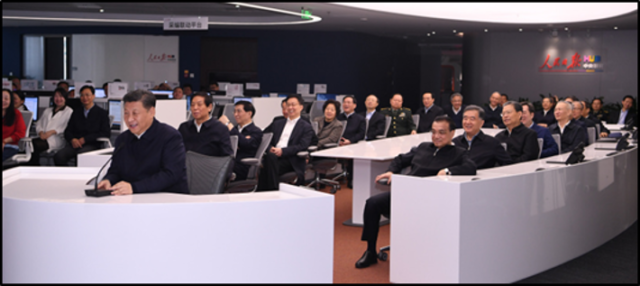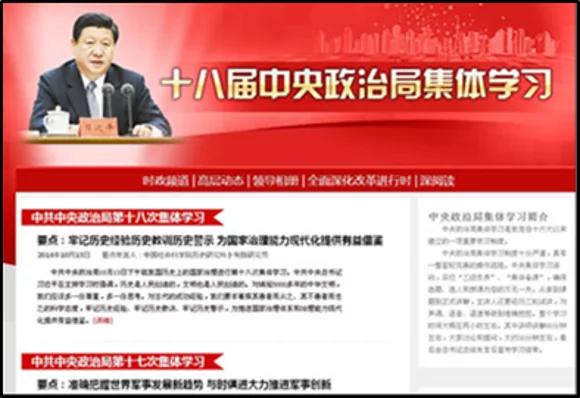
The CCP Politburo Holds Its First Collective Study Session for 2020
Publication: China Brief Volume: 20 Issue: 11
By:

Introduction
On May 29, the Chinese Communist Party (CCP) Politburo held its first “collective study” (集体学习, jiti xuexi) session for the year 2020. It is unusual that the first of these events took place only near the mid-point of the year: in recent years, these Politburo political study sessions have been convened either monthly or on alternate months, with an average occurrence of 8 times per year. [1] Throughout the early months of 2020, the political leadership of the People’s Republic of China (PRC) has been focused upon the COVID-19 crisis and its attendant problems—which have included a worsening of the country’s economic problems, and the delay of the “Two Sessions” (the annual convening of the National People’s Congress and the Chinese People’s Political Consultative Conference) from the usual timeframe of early March to late May (China Brief, May 26; China Brief, May 29). The delay of the first of the Politburo’s study sessions until the end of May is likely a further indication of the extent to which the COVID-19 crisis has absorbed the attention of the senior CCP leadership.
Politburo study sessions are publicized under an overarching official theme: for example, in the previous designated Politburo study session (held on November 29 of last year), the official theme was “Building the Capacity of Our Country’s Emergency Management System” (我国应急管理体系和能力建设, Woguo Yingji Guanli Tixi he Nengli Jianshe) (Gongchandang Wang, ongoing). In 2019, one theme was so important that it was actually the subject of two separate Politburo study sessions: “Don’t Forget [Our] Original Purpose and Firmly Remember the Mission” (不忘初心, 牢记使命 Wang Chuxin, Laoji Shiming), a slogan unveiled in summer 2019 that has been closely associated with CCP General Secretary Xi Jinping’s drive for reinforced ideological orthodoxy within the ruling party (China Brief, July 31, 2019). The first meeting to feature this theme was a study session on June 24 (see chart below); the second was the end-of-year Politburo “democratic life meeting” convened on December 26-27 (China Brief, January 29). [2]
Politburo collective study sessions in recent years have been unabashedly connected to the cult of personality surrounding Xi Jinping, and are part of a broader propaganda effort to portray Xi as a policy expert and great ideological thinker. Official commentary on these meetings always emphasizes Xi’s authoritative position, invariably stating that the senior leader “presided over… the collective study and delivered an important speech” (主持…集体学习并发表重要讲话, zhuchi… jiti xuexi bing fabiao zhongyao jianghua). [3] Official summaries of these meetings begin nearly every paragraph with one of two stock phrases: either “Xi Jinping emphasized that…” (习近平强调, Xi Jinping qiangdiao), or “Xi Jinping pointed out that…” (习近平指出, Xi Jinping zhichu) (Xuexi Qiangguo, May 29).
| CCP Politburo “Collective Study” Sessions Convened in 2019 | ||
| Date | Theme (English) | Theme (Chinese) |
| January 25 | “The Age of Comprehensive Media and the Development of Media Fusion” | 全媒体时代和媒体融合发展 (Quan Meiti Shidai he Meiti Ronghe Fazhan) |
| February 22 | “Perfecting Financial Services, Guarding Against Financial Risks” | 完善金融服务、防范金融风险 (Wanshan Jinrong Fuwu, Fangfan Jinrong Fengxian) |
| April 19 | “The Historical Significance and Contemporary Value of the May Fourth Movement” | 五四运动的历史意义和时代价值 (Wu-Si Yundong de Lishi Yiyi he Shidai Jiazhi) |
| June 24 | “Don’t Forget [Our] Original Purpose and Firmly Remember the Mission, Advancing the Self-Revolution” | 牢记初心使命,推进自我革命 (Laoji Chuxin Shiming, Tuijin Ziwo Geming) |
| July 30 | “Advancing Military Policy System Reform” | 推进军事政策制度改革 (Tuijin Junshi Zhengce Zhidu Gaige) |
| September 24 | “The Formation and Development of New China’s National System and Legal System” | 新中国国家制度和法律制度的形成和发展 (Xin Zhongguo Guojia Zhidu he Falu Zhidu de Xingcheng he Fazhan) |
| October 24 | “Current Conditions and Trends in the Development of Blockchain Technology” | 区块链技术发展现状和趋 (Qukuailian Jishu Fazhan Xianzhuang he Qu) |
| November 29 | “Building the Capacity of Our Country’s Emergency Management System” | 我国应急管理体系和能力建设 (Woguo Yingji Guanli Tixi he Nengli Jianshe) |
(Source: Compiled by the author, from Xuexi Qiangguo)
Themes from the May 29 Politburo Meeting
The official central theme of the May 29 Politburo study session was “Practically Implement the Civil Code” (切实实施民法典, Qieshi Shishi Minfadian), stressing the message that more rigorous application of civil law would improve the ability of party and state organs to “better safeguard the people’s lawful rights and interests according to law” (依法更好保障人民合法权益, yifa genghao baozhang renmin hefa quanyi) (Xuexi Qiangguo, May 29). Much of the official commentary on the session represented a verbose recitation of slogans, rather than a substantive summary of any concrete initiatives under consideration by the Politburo. However, in broad terms, three general themes may be gleaned from the official summary:
The role of civil law in improving the CCP’s capacity for effective governance. The phrase “administering the country according to law” (依法治国, yifa zhiguo) featured prominently in coverage of the May 29 meeting. This has long been a significant slogan in CCP discourse, but it is one that has achieved particular prominence under Xi. Per the official summary, more effective application of civil law will “raise the importance of using the civil code to uphold the people’s rights, resolve contradictions and disputes, and promote our capacity [to uphold] standards for social harmony and stability” (Xuexi Qiangguo, May 29).
Employing the civil law for stricter social control. In conjunction with the theme of more effective governance, in the official account Xi was depicted as calling for the CCP to more strictly apply laws and regulations in order to achieve more efficient social control. Xi reportedly called for stricter “standards in administering permits, administering punishments, administering coercive [actions], administering tax collection, administering the collection of fees, administering inspections, administering rulings, [and] raising up [our] administrative capacity… According to law, deal severely with behaviors and officials that violate the lawful rights of the masses” (Xuexi Qiangguo, May 29).
Touting civil law protections to provide economic reassurance to commercial enterprises. Facing tri-fold economic pressures from the U.S.-China “trade war,” the potential decoupling of foreign businesses from China, and the COVID-19 pandemic, Beijing has taken recent steps to send a message of reassurance to foreign firms operating or investing in China (Xinhua, May 21; NPC Work Report, May 25). Commentary on the May 29 Politburo session asserted that “the building of our country’s civil law and commercial law system is proceeding at an ever-more rapid pace,” and stressed the capacity of PRC law for “property security [and] commercial transaction facilitation.” Party and state organs were advised to “consider civil code regulations, so that they do not infringe upon the lawful civil rights of the masses, including personal security and property rights” (Xuexi Qiangguo, May 29).

The resumption of the Politburo’s periodic “collective study” sessions is likely another sign that the central CCP leadership wishes to project a return to normalcy after the disruptions caused by the COVID-19 pandemic throughout the earlier months of 2020. It is also a further sign that the state propaganda apparatus has returned to its unabashed promotion of Xi’s cult of personality—an effort that dimmed temporarily earlier this year, when Xi assumed a less visible posture and other senior CCP officials briefly adopted a more prominent public presence (China Brief, February 5; China Brief, February 13). With the end of the most intense phase of the COVID-19 crisis—at least for now—the top echelon of CCP leadership, and the propaganda apparatus at its command, is returning its attention to many of the policy priorities in place prior to the epidemic.
John Dotson is the editor of China Brief. For any comments, queries, or submissions, feel free to reach out to him at: cbeditor@jamestown.org.
Notes
[1] The Politburo held eight collective study sessions in 2019; nine in 2018; eight in 2017; and eight in 2016. See: “Central Politburo Collective Study” (中央政治局集体学习, Zhongyang Zhengzhiju Jiti Xuexi), Xuexi Qiangguo (学习强国) website (ongoing). https://www.xuexi.cn/9bc28239c691139fe0bdbd0f38126f8c/9a3668c13f6e303932b5e0e100fc248b.html.
[2] Note that the December 26-27, 2019 “democratic life meeting” of the CCP Politburo fell outside the official sequence of the Politburo’s “collective study” meetings, and was not counted among the eight study sessions for 2019. However, this traditional end-of-year Politburo meeting is still publicized by PRC state media as an ideological study session for the top CCP leadership.
[3] “Central Politburo Collective Study” (中央政治局集体学习, Zhongyang Zhengzhiju Jiti Xuexi), Xuexi Qiangguo (学习强国) website (ongoing). https://www.xuexi.cn/9bc28239c691139fe0bdbd0f38126f8c/9a3668c13f6e303932b5e0e100fc248b.html.




